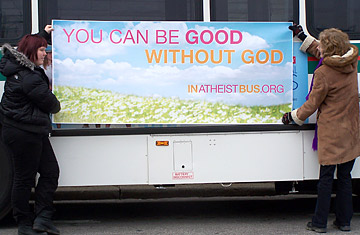
Members of the Indiana Atheist Bus Campaign hold up one of their ads on a bus in Bloomington, Ind.
Dangling from the sides of Chicago public buses in recent days: large signs bearing the slogan, "In the beginning, man created God."
Lo and behold, the atheist bus war that raged through London earlier this year has led to the opening of a front in the U.S. The Chicago ads were purchased this month (for a total of $5,000) by the Indiana Atheist Bus Campaign.
Despite Chicago's abundance of trains, the Indiana group preferred to buy ads that would appear on the outside of buses. "That way, cars can see them. People on the sidewalks can see them, as the buses go zipping by," says Charlie Sitzes, 73, the group's spokesman. Apart from the predictable blogosphere chatter, Chicago has largely greeted the ads with a quick, curious look and then a shrug. While the media attention has drawn donations to the group from across the country, there are no plans to extend the ads' run beyond mid-June. "You don't have to shake the believer tree too hard to get a discussion going," Sitzes says, adding, "We've already won." (See the top 10 religion stories of 2008.)
In a way, the nonbelievers were a little late to the game in Chicago. The pious have been buying ad space from the city's decaying, cash-strapped public transportation system for a while. One recent religious ad read, "ISLAM. Got questions? Get answers. FREE Quran & Literature," followed by a toll-free telephone number. (Watch TIME's video "Bethlehem's Complicated Christmas.")
Chicago wasn't the first target of the Indiana atheists. Earlier this year, the five or so members of the Secular Alliance of Indiana University, in Bloomington, closely followed the well-publicized atheist efforts in Britain (which, thanks to the fervor of the British press, received global coverage). "Why don't we try something like that?" one student asked at a meeting. They bounced around ideas and came up with a campaign to raise money to place ads on buses in the handful of Indiana cities with populations over 50,000. But that was turned down by the public transportation system in Bloomington (pop. 72,254). The local chapter of the American Civil Liberties Union has since filed a lawsuit on First Amendment grounds. Indianapolis' public transportation system also declined. Michael Terry, its chief executive, pointed to a policy barring ads "involving or referring to political, religious, moral or environmental issues subject to public debate." Terry says, "It costs us a lot of revenue, to be that restrictive."
Next, the alliance tried the South Bend, Ind., system, which had accepted ads from various religious groups and so had little choice but to take the atheists' ads. While no protests attended the acceptance, South Bend, home to the University of Notre Dame, now has a moratorium on new noncommercial ads, until a formal policy is written. Now appearing on South Bend's buses: "You can be good without God."
While the bus ads are confrontational just by the nature of their placement, atheist advertising is not new. In 2007, the American Humanist Association, a Washington-based group of roughly 11,000 members that questions the existence of one God, any god, the supernatural or an afterlife, bought ads in publications like the Nation and the Progressive. Then, late last year, the group splashed its first bus ads in the U.S., buying space in Washington, D.C., with the line, "Why believe in God? Just be good for goodness sakes." It caused a flurry of complaints from believers but was somewhat overshadowed by the postelection excitement over the incoming President (who would later acknowledge the contributions of atheists to the U.S. in his Inaugural speech, saying "We are a nation of Christians and Muslims, Hindus and nonbelievers"). (Watch a video "Tony Blair's New Calling.")
The association has recently bought billboard space outside Philadelphia and Charleston, S.C., as well as somewhat obscure locales, like Highway 95, near Moscow, Idaho. That location was particularly appealing, says Roy Speckhardt, the group's executive director, partly because of its proximity to two major universities in Idaho and Washington State. "There's a great mix of progressive, secular and religious people there," he says. Similar ads are being planned for about 20 cities, including Minneapolis, New York and Los Angeles. There is a push to get another spokesman to champion the cause. "I see this movement as a civil rights movement of sorts, not dissimilar to the movement for gay rights," he says.
The aim, Speckhardt says, "is to attract the interest of those who already believe as we do. We're not trying to convert people." Referring to a recent poll, he notes that more Americans view themselves as nonbelievers than the population of Jews, Muslims and Mormons combined. "Yet," he says, "you don't see that group having a caucus in Congress or anywhere else. It's a group that's been in the closet. People are afraid to 'come out' to their families and say they don't believe in God." The ads are designed to show lonely atheists that they do not walk alone — and they can go on disbelieving.
Read a story from TIME's archives: "The Varieties of Non-Religious Experience."
